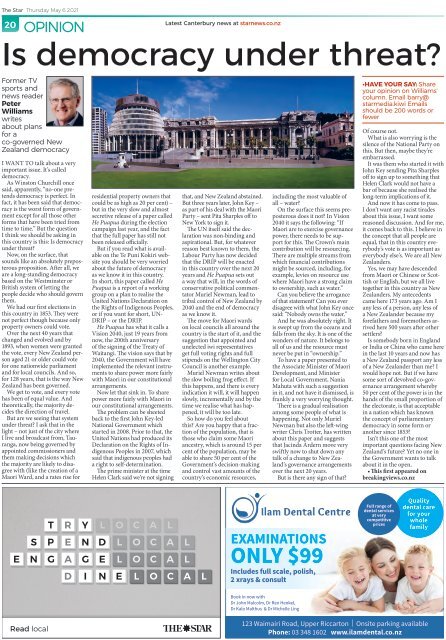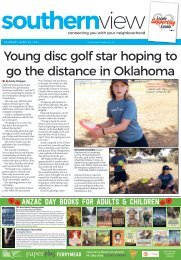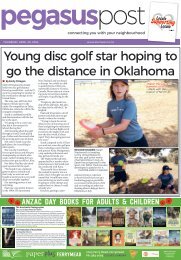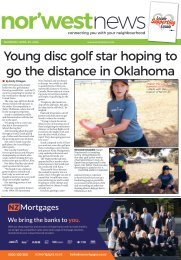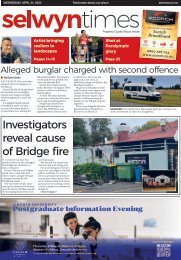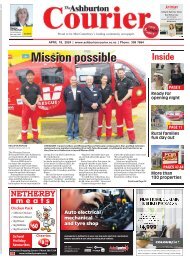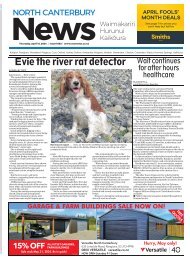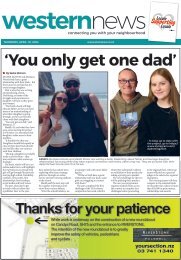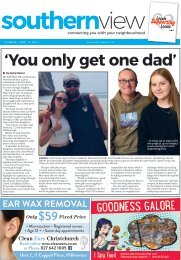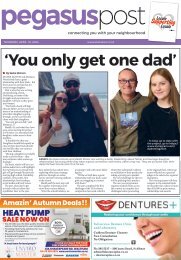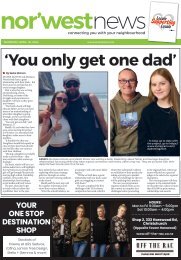The Star: May 06, 2021
Create successful ePaper yourself
Turn your PDF publications into a flip-book with our unique Google optimized e-Paper software.
<strong>The</strong> <strong>Star</strong> Thursday <strong>May</strong> 6 <strong>2021</strong><br />
20<br />
OPINION<br />
Latest Canterbury news at starnews.co.nz<br />
Is democracy under threat?<br />
Former TV<br />
sports and<br />
news reader<br />
Peter<br />
Williams<br />
writes<br />
about plans<br />
for a<br />
co-governed New<br />
Zealand democracy<br />
I WANT TO talk about a very<br />
important issue. It’s called<br />
democracy.<br />
As Winston Churchill once<br />
said, apparently, “no-one pretends<br />
democracy is perfect. In<br />
fact, it has been said that democracy<br />
is the worst form of government<br />
except for all those other<br />
forms that have been tried from<br />
time to time.” But the question<br />
I think we should be asking in<br />
this country is this: Is democracy<br />
under threat?<br />
Now, on the surface, that<br />
sounds like an absolutely preposterous<br />
proposition. After all, we<br />
are a long-standing democracy<br />
based on the Westminster or<br />
British system of letting the<br />
people decide who should govern<br />
them.<br />
We had our first elections in<br />
this country in 1853. <strong>The</strong>y were<br />
not perfect though because only<br />
property owners could vote.<br />
Over the next 40 years that<br />
changed and evolved and by<br />
1893, when women were granted<br />
the vote, every New Zealand person<br />
aged 21 or older could vote<br />
for one nationwide parliament<br />
and for local councils. And so,<br />
for 128 years, that is the way New<br />
Zealand has been governed.<br />
We get to vote, and every vote<br />
has been of equal value. And<br />
theoretically, the majority decides<br />
the direction of travel.<br />
But are we seeing that system<br />
under threat? I ask that in the<br />
light – not just of the city where<br />
I live and broadcast from, Tauranga,<br />
now being governed by<br />
appointed commissioners and<br />
them making decisions which<br />
the majority are likely to disagree<br />
with (like the creation of a<br />
Maori Ward, and a rates rise for<br />
residential property owners that<br />
could be as high as 20 per cent) –<br />
but in the very slow and almost<br />
secretive release of a paper called<br />
He Puapua during the election<br />
campaign last year, and the fact<br />
that the full paper has still not<br />
been released officially.<br />
But if you read what is available<br />
on the Te Puni Kokiri website<br />
you should be very worried<br />
about the future of democracy<br />
as we know it in this country.<br />
In short, this paper called He<br />
Puapua is a report of a working<br />
group on a plan to realise the<br />
United Nations Declaration on<br />
the Rights of Indigenous Peoples,<br />
or if you want for short, UN-<br />
DRIP – or the DRIP.<br />
He Puapua has what it calls a<br />
Vision 2040, just 19 years from<br />
now, the 200th anniversary<br />
of the signing of the Treaty of<br />
Waitangi. <strong>The</strong> vision says that by<br />
2040, the Government will have<br />
implemented the relevant instruments<br />
to share power more fairly<br />
with Maori in our constitutional<br />
arrangements.<br />
Now let that sink in. To share<br />
power more fairly with Maori in<br />
our constitutional arrangements.<br />
<strong>The</strong> problem can be sheeted<br />
back to the first John Key-led<br />
National Government which<br />
started in 2008. Prior to that, the<br />
United Nations had produced its<br />
Declaration on the Rights of Indigenous<br />
Peoples in 2007, which<br />
said that indigenous peoples had<br />
a right to self-determination.<br />
<strong>The</strong> prime minister at the time<br />
Helen Clark said we’re not signing<br />
that, and New Zealand abstained.<br />
But three years later, John Key –<br />
as part of his deal with the Maori<br />
Party – sent Pita Sharples off to<br />
New York to sign it.<br />
<strong>The</strong> UN itself said the declaration<br />
was non-binding and<br />
aspirational. But, for whatever<br />
reason best known to them, the<br />
Labour Party has now decided<br />
that the DRIP will be enacted<br />
in this country over the next 20<br />
years and He Puapua sets out<br />
a way that will, in the words of<br />
conservative political commentator<br />
Muriel Newman, lead to<br />
tribal control of New Zealand by<br />
2040 and the end of democracy<br />
as we know it.<br />
<strong>The</strong> move for Maori wards<br />
on local councils all around the<br />
country is the start of it, and the<br />
suggestion that appointed and<br />
unelected iwi representatives<br />
get full voting rights and full<br />
stipends on the Wellington City<br />
Council is another example.<br />
Muriel Newman writes about<br />
the slow boiling frog effect. If<br />
this happens, and there is every<br />
indication it will, it will happen<br />
slowly, incrementally and by the<br />
time we realise what has happened,<br />
it will be too late.<br />
So how do you feel about<br />
this? Are you happy that a fraction<br />
of the population, that is<br />
those who claim some Maori<br />
ancestry, which is around 15 per<br />
cent of the population, may be<br />
able to share 50 per cent of the<br />
Government’s decision-making<br />
and control vast amounts of the<br />
country’s economic resources,<br />
including the most valuable of<br />
all – water?<br />
On the surface this seems preposterous<br />
does it not? In Vision<br />
2040 it says the following: “If<br />
Maori are to exercise governance<br />
power, there needs to be support<br />
for this. <strong>The</strong> Crown’s main<br />
contribution will be resourcing.<br />
<strong>The</strong>re are multiple streams from<br />
which financial contributions<br />
might be sourced, including, for<br />
example, levies on resource use<br />
where Maori have a strong claim<br />
to ownership, such as water.”<br />
Can you believe the arrogance<br />
of that statement? Can you ever<br />
disagree with what John Key once<br />
said: “Nobody owns the water.”<br />
And he was absolutely right. It<br />
is swept up from the oceans and<br />
falls from the sky. It is one of the<br />
wonders of nature. It belongs to<br />
all of us and the resource must<br />
never be put in “ownership.”<br />
To have a paper presented to<br />
the Associate Minister of Maori<br />
Development, and Minister<br />
for Local Government, Nania<br />
Mahuta with such a suggestion<br />
in it, and not have it dismissed, is<br />
frankly a very worrying thought.<br />
<strong>The</strong>re is a gradual realisation<br />
among some people of what is<br />
happening. Not only Muriel<br />
Newman but also the left-wing<br />
writer Chris Trotter, has written<br />
about this paper and suggests<br />
that Jacinda Ardern move very<br />
swiftly now to shut down any<br />
talk of a change to New Zealand’s<br />
governance arrangements<br />
over the next 20 years.<br />
But is there any sign of that?<br />
•HAVE YOUR SAY: Share<br />
your opinion on Williams’<br />
column. Email barry@<br />
starmedia.kiwi Emails<br />
should be 200 words or<br />
fewer<br />
Of course not.<br />
What is also worrying is the<br />
silence of the National Party on<br />
this. But then, maybe they’re<br />
embarrassed.<br />
It was them who started it with<br />
John Key sending Pita Sharples<br />
off to sign up to something that<br />
Helen Clark would not have a<br />
bar of because she realised the<br />
long-term implications of it.<br />
And now it has come to pass.<br />
I don’t want any racist tirades<br />
about this issue, I want some<br />
reasoned discussion. And for me,<br />
it comes back to this. I believe in<br />
the concept that all people are<br />
equal, that in this country everybody’s<br />
vote is as important as<br />
everybody else’s. We are all New<br />
Zealanders.<br />
Yes, we may have descended<br />
from Maori or Chinese or Scottish<br />
or English, but we all live<br />
together in this country as New<br />
Zealanders. My antecedents<br />
came here 173 years ago. Am I<br />
any less of a person, any less of<br />
a New Zealander because my<br />
forefathers and foremothers arrived<br />
here 500 years after other<br />
settlers?<br />
Is somebody born in England<br />
or India or China who came here<br />
in the last 10 years and now has<br />
a New Zealand passport any less<br />
of a New Zealander than me? I<br />
would hope not. But if we have<br />
some sort of devolved co-governance<br />
arrangement whereby<br />
50 per cent of the power is in the<br />
hands of the small proportion of<br />
the electorate, is that acceptable<br />
in a nation which has known<br />
the concept of parliamentary<br />
democracy in some form or<br />
another since 1853?<br />
Isn’t this one of the most<br />
important questions facing New<br />
Zealand’s future? Yet no one in<br />
the Government wants to talk<br />
about it in the open.<br />
• This first appeared on<br />
breakingviews.co.nz<br />
EXAMINATIONS<br />
ONLY $99<br />
Includes full scale, polish,<br />
2 xrays & consult<br />
Full range of<br />
dental services<br />
at very<br />
competitive<br />
prices<br />
Quality<br />
dental care<br />
for your<br />
whole<br />
family<br />
Book in now with<br />
Dr John Malcolm, Dr Ren Henkel,<br />
Dr Kalo Malthus & Dr Michelle Ling<br />
Read local<br />
123 Waimairi Road, Upper Riccarton | Onsite parking available<br />
Phone: 03 348 1602 www.ilamdental.co.nz


